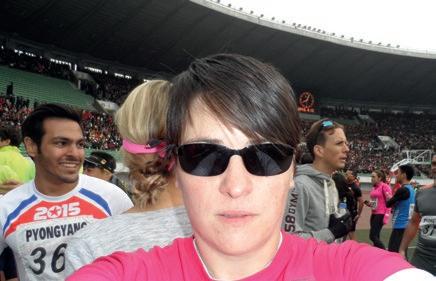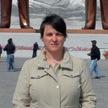
6 minute read
Inside the Secret State
from Aston in Touch 2017
by Aston Alumni

"When I go to yoga and look down at my trainers I think ‘Yeah, I wore these to run in the streets of Pyongyang’,” says Dr Virginie Grzelczyk with an air of disbelief. She is sitting in her office on a sunny afternoon, her desk flanked by two full-sized Korean flags (North and South). On the wall there is a marathon runner’s number and some Korean airline tickets in a frame; the shelves are dotted with what look like LEGO models, but on closer inspection prove to be the work of a Korean competitor (unlike any LEGO battleship you might see, the Korean ones are bristling with toy guns).
Advertisement
A Senior Lecturer in International Relations at Aston University, Dr Grzelczyk is an expert on Northeast Asia. Her recent book, North Korea’s New Diplomacy: Challenging Political Isolation in the 21st Century, looks at new patterns of interaction between North Korea and the international community and aims to demolish a few myths about the ‘secret state’. It is not possible to visit North Korea as a researcher unless you are a guest of the state, and that brings its own challenges, such as having your work vetted by the Government. However, in 2015 Dr Grzelczyk spotted an opportunity. Every year North Korea hosts an international marathon to coincide with the anniversary of Kim Il-sung’s birth. In 2015 it extended the invitation to amateur runners, so Dr Grzelczyk - not usually a runner - forced herself into training and entered the 10km race. She did not hide her affiliation with Aston University or her research interests, believing it was better to be transparent in her dealings with the authorities, but she was curious to see how the country would cope with an influx outsiders. Before long she was at Birmingham Airport waiting to take a Lufthansa flight to Frankfurt; from there she would take a flight to Beijing, and from Beijing, another flight to the North Korean capital of Pyongyang.


Dr Virginie Grzelczyk
Dr Grzelczyk’s interest in North Korea (what she jokingly calls her “obsession”) happened almost by chance while she was a student in her native France. She was given the opportunity to visit South Korea on a student exchange and it was there that she started to study International Relations. She stayed in South Korea to study a Masters in Diplomacy, where she explored conflict and security, before moving to the United States to work on conflict resolution at the University of Maryland. It was here that she started to look at North Korea from a new perspective. “Essentially I was trying to see if there was a North Korean negotiation strategy and whether we could have more co-operative outcomes. That was in 2006. I finished my PhD even before North Korea tested its first nuclear weapon.”
Just over ten years later and North Korea is well known for its provocative missile tests, as well as for its enigmatic figurehead Kim Jong-un, Supreme Leader of the self-styled Democratic People’s Republic of Korea (DPRK). Following the election of Donald Trump, North Korea tested a long-range rocket weapon and has conducted many missile launches in defiance of UN sanctions; this is not just a threat but a method of communication with the outside world. North Korea has long dabbled in chemical and biological weapons, too, such as the VX nerve agent used to murder the Leader’s half-brother Kim Jong-nam last February (although North Korea is suspected of carrying out the attack, solid proof is still to emerge). In many ways, things have changed, but also stayed the same - the questions that Dr Grzelczyk was asking in 2006 are still vital, and we still do not know if cooperation is possible.

As she says in her book, after a 30-year process of colonization by the Japanese, a partition, and a bitter war, the world in which a 21st-century North Korea operates is framed by its antagonists (US, Japan), its ideological neighbours (China, Russia and the Communist world), and its significant other and brother-in-arms, South Korea. “It’s almost the perfect political science experiment,” she tells me, not entirely seriously. “You take one country, with one history; you split it in half, and then you put a completely different political and economic system in each half. Then you see what happens.” What has happened in the South is well documented, but the mystique of the North - the so-called ‘rogue state’ - has made it a constant target of media speculation. The result, says Dr Grzelczyk, has been the development of unhelpful myths - that North Korea is crazy; that is about to collapse; that it is impossible to find information about it.
“There is a lot being talked about in the media but not much is being added to the table. Saying that North Korea is crazy is a dangerous proposition because it means we are treating them as special, and we are not engaging with them. If they are going to collapse, we don’t need to think about their future because they don’t have one. And if we can’t find any information about North Korea, how do we know that they are crazy and about to collapse? In a way I think we need to go deeper. Why are we using those particular words? Is it actually helping anyone?”
In fact, despite sanctions from the UN Security Council - which prevent exports of coal and which also block large monetary transactions - North Korea’s economy seems to be picking up: an issue that the “collapse” narrative has led many to ignore. One of North Korea’s strategies to raise revenue has been to send its construction workers abroad (to Qatar, for example, to help with preparations for the 2022 World Cup); wages are paid directly to the State in foreign currency, which gets around some of the sanctions. Another activity - recently blocked by fresh sanctions - has been the sale of large Soviet-style monuments to African states. A third is tourism. In 2014 North Korea launched a ski resort, Masikryong, which, according to an announcement by the DPRK Ministry of Sports, was part of a drive to “make people not only possess strong physiques and sound mentality, but also enjoy their sports and cultural lives” - and, of course, to bring in money. The Pyongyang Marathon is a similar example of sports tourism, which Dr Grzelczyk attended through the official commercial partner, Koryo Tours. The experience was fascinating, often unnerving, but did not, she says, change her ideas about the country she has been studying for so long.
“There are guides, actually minders, everywhere. You can’t do anything by yourself; you can’t leave the hotel except to go down to the parking lot. The interesting thing is that you run in the city and you’re pretty much on your own during the race. There was this sense of confusion since everyone finished at a different time, and the finish line for the 10k was just outside of the stadium. They take you to the statues [in Kim Il-sung Square]. The media talk of being forced to pay your respects, but it’s like going to someone’s funeral when you’re not religious. You go with it.
“So we’ve got this Catch 22 of a country trying to grapple with development and attracting outsiders. They have found ways to generate cash and they are not doing it alone. But we must not forget that it’s a horrible regime - people are being sacrificed for the survival of the elite. I don’t want this to be North Korea seen through rosy glasses. The key thing for a researcher is that, when you’re there, nobody infiltrates your mind. You remain alert and that’s very important.”


Dr Virginie Grzelczyk joined the Department of Languages & Social Sciences at Aston University in 2013. Prior to coming to the United Kingdom, she held appointments at George Washington University and Lafayette College in the United States, and at Victoria University in New Zealand. Her new book “North Korea’s New Diplomacy: Challenging Political Isolation in the 21st Century” (Palgrave Macmillan) is available now.



